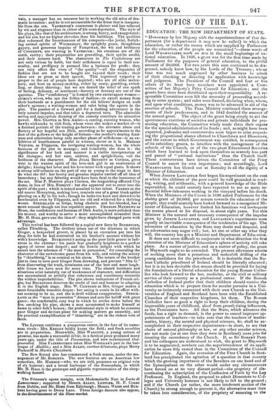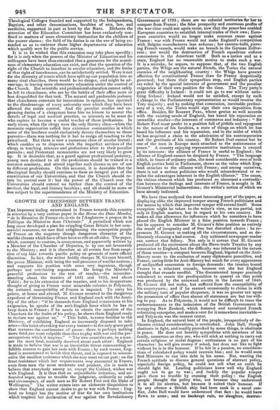TOPICS OF THE DAY.
EDUCATION: THE NEW DEPARTMENT OF STATE.
" HONOURED by her Majesty with the superintendence of that de- partment (for a department it may now be called) to which the education, or rather the means which are supplied by Parliament for the education, of the people are committed"—these words of Lord WHARNCLIFFE mark an Era in the small beginnings of na- tional education. In 1836, a grant was for the first time made by Parliament for the purposes of general education, to the pitiful amount of 20,000/. For two }ears this sum continued to be dis- pensed, nobody knew how, by the Lords of the Treasury ; whose time was too much engrossed by other business to admit of their checking or directing its application with knowledge and judgment. The President of the Council and four or five others of its least busy members were appointed a Com- mittee of her Majesty's Privy Council for Education ; and the grants have since been distributed upon their responsibility. A re- sponsible Committee soon felt the necessity of proceeding accord- ing to some system ; and rules were framed, declaring when, where, and upon what conditions, money was to be advanced in aid of the erection of schools. The PEEL Ministry continued these arrange- ments of their predecessors, and in 1842 doubled the amount of the annual grant. The object of the grant being simply to aid the spontaneous exertions of societies and private individuals for pro- moting education, the Committee wisely made them their organs for the-special administration of its funds ; and, as might have been expected, jealousies and controversies soon began to arise respect- ing the proportional shares allotted to Churchmen and Dissenters, and the extent to which Government was entitled, in consequence of its subsidiary grants, to interfere with the management of the schools of the Church, or of the two great Educational Societies which have learned to look upon themselves as scarcely less part and parcel of " national institutions" than the Church itself. These controversies have driven the Committee of the Privy Council to assert its own importance ; and accordingly, Lord WHARNCLIFFE has blazed out at Barnsley in all the dignity of a Minister of Education.
When JOSEPH LANCASTER first began his experiment on the cost at which the children of the poor could be well grounded in read- ing, writing, and arithmetic, with a general knowledge of the Bible superadded, he could scarcely have expected to see so many in- fluential fellow-labourers working in the vineyard before his death. When the Ministers of the Crown in 1836 asked Parliament for the shabby grant of 20,000/. per annum towards the education of the people, they could scarcely have looked forward to a recognized Mi- nister of Education, however limited his functions and inadequate the means placed at his disposal, in about eight years. Yet this Minister is the natural and necessary consequence of the impulse given by JOSEPH LANCASTER, and LANCASTER'S experiments were equally an inevitable consequence of the tendencies of his age. The advocates of education by the State may doubt and despond, and its adversaries may augur evil ; but, let one or other say what they will, the country has got a Minister and Department of Education. It does not seem difficult to conjecture in what direction the first extension of the Minister of Education's sphere of activity will take place. As a matter of justice, and as a matter of policy, the grant to Maynooth ought to be extended. The present allowance admits of nothing more than a penurious and makeshift drilling of the young candidates for the priesthood. It is desirable that the Ro- man Catholic priesthood of Ireland should be liberally educated; but it is no less desirable that means should be provided for laying the foundations of a liberal education for the young Roman Catho- lics who look forward to the bar, medicine, or the civil or military service of their country as a professional career. If the Roman Catholics of Ireland prefer that their children should receive the education which is to prepare them for secular pursuits in a Uni- versity as intimately connected with their OWD Church as the Uni- versities of England and Scotland have been with the Established Churches of their respective kingdoms, let them. The Roman Catholics have as good a right to keep their children, during the impressible years of childhood, aloof from proselytizing influences, as the Protestants have. All that the State, which advances the funds, has a right to demand, is the power to cancel improper ap- pointments of teachers—to take care that the teachers of mathe- matics, history, the mental and physical sciences, &c. shall be ac- complished in their respective departments—in short, to see that chairs of natural philosophy or law, or any other secular science, are not made (as at one time they were in Scotland) mere jobs for insuring the ascendancy of the Church. If, as Sir ROBERT PEEL and his colleagues are understood to wish, the grant to May nooth is to be augmented, nowhere can the superintendence of its appli- cation be more fitly vested than in the Committee of the Council for Education. Again, the secession of the Free Church in Scot- land has precipitated the agitation of a question in that country which the growing importance of the Seceders on one hand and of the Episcopalians on the other would under any circumstances have forced on at no very distant period—the propriety of dis- continuing the subscription of the Confession of Faith by the Lay Professors. In England, the proposal to admit Dissenters to Col- leges and University honours is not likely to fall to the ground ; and if the Church (or rather, the more intolerant section of the Church) be strong enough to prevent it, the alternative must then be taken into consideration, of the propriety of annexing to the
Theological Colleges founded and supported by the Independents, Baptists, and other denominations, faculties of arts, law, and medicine, supported in part at least by the State. Hitherto the attention of the Education Committee has been exclusively con- fined to matters of mere elementary instruction for the children of the poorer classes ; the field of its duties is on the eve of being ex- tended so as to embrace those higher departments of education which qualify men for the public service. It is to be wished that this extension may take place speedily ; for it is only when the powers of the Minister of Education and his colleagues have been thus extended that a guarantee for the sound- ness of elementary education can exist, and that the question of the right of the Church to interfere in secular education, and the limits of that right of interference, can be satisfactorily settled. Were it not for the diversity of tenets which have split up our population into so many rival churches, there would be no danger, and might be ad- vantage, in leaving mere elementary education under the control of the Church. But scientific and professional education cannot safely be left to churchmen, who are by the habits of their office more or less disqualified for that task. The natural and pardonable jealousy that churchmen entertain for innovations in opinion, has operated to the disadvantage of every university over which they have been allowed the entire control. And the peculiar studies and en- grossing duties of a clergyman leave him no leisure to master the details of legal and medical practice, so minutely as he must do who aspires to become a useful teacher of those professions. In early times, when the clergy were the only literary class—when the monastic organization called into existence communities in which some of the brethren could exclusively devote themselves to those pursuits—there was nothing for it but to resign all teaching to the priesthood. But there is now a numerous class of secular literati ; which enables us to dispense with the imperfect services of the clergy in teaching sciences and professions alien to their peculiar pursuits ; and Protestant monasteries are not very likely to grow up. It is desirable that, as a guard against professional pedantry, young men destined to all the professions should be trained in a common seminary, and attend together such classes as are of use to different professions. On this account, it is desirable that the theological faculty should continue to form an integral part of the constitution of our Universities, and that the Church should re- tain its control over it : but the power of the Church over the Universities should extend no further than the control of the medical, the legal, and literary faculties ; and all should be more or less subject to the superintendence of the Ministry of Education.



























 Previous page
Previous page